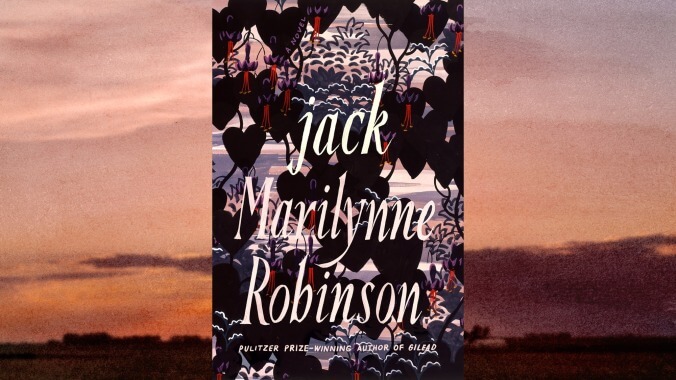Marilynne Robinson finds transcendence in the stunning, soul-searching Jack

Marilynne Robinson’s books are open questions to the reader, each thoughtful, considered moment in the lives of her characters quietly inviting you to consider your own present moment in the world; not to compare circumstances, but to acknowledge that circumstances are always more than they seem. That your life, at this very moment, has meaning. It’s not always easy to appreciate that fact, and it’s not always an inviting task.
But it’s certainly rewarding. Jack, the latest novel from Robinson, has ample pleasures, rarely separable from the potent spiritual and existential concepts and stirring emotions conjured by her narrative. It’s probably not necessary to dwell too much on the plot: John Ames Boughton, the black sheep of his family, has carved out an aimless and dispiriting life, his long history of selfishness and destructive behavior having sent him to a near-penniless existence in St. Louis. After two years in jail, he ekes out a survival from a sad room in a flophouse, alternating between unemployment and short-term gigs, often drunk and prone to assaults from local gambling-debt collectors. This all begins to change once he meets Della, a schoolteacher with whom he finds a simple but fiercely loyal romance. Unfortunately, this is long before Loving V. Virginia—John is white, Della is Black, and any interracial relationship isn’t just a legal dead end, but a threat to their very lives from the disapproving world that surrounds them. It all sounds like a Hallmark weepie, but in Robinson’s hands, it becomes transcendent.
Although this is the fourth of the author’s Gilead novels, the reader needn’t know anything about the previous books to become ensnared in its meditative reflection on guilt, love, and forgiveness. True, if you’ve read Gilead, Robinson’s 2005 Pulitzer Prize winner for fiction, you know this story doesn’t have a happy ending: In that book, Boughton is a tertiary character who returns home to the titular Iowa town to live with his minister father, though it’s not until the denouement that one learns that Boughton is suffering the forced separation from his common-law wife and son, thanks to segregation laws and her family’s rejection of him. That’s the tragic future that awaits, roughly eight years after the events of this new novel.
Here, though, the tragedy doesn’t stem from the outside world, but John’s internal struggle to transcend his past. Having recognized his drive toward destruction, he’s decided to live a life of isolation to avoid hurting anyone other than himself. Because he’s made bad choices so consistently in the past, disappointing everyone from his devout father to his siblings to his prior targets of romance, John is convinced he’s a certain way—a “textbook case of human degeneracy,” as he jokingly refers to himself with total seriousness. Jack is about the struggle to live with guilt, and the ways in which we can still find grace, or even a measure of redemption, in caring for others more than ourselves. Yet it’s no simple case of being redeemed by love, or any such facile summation. How does one know what caring for others means—should it involve also caring about oneself? Does it allow for finding joy in things that also cause pain? Life is messy, in other words, but as one of the few kind advisors in Jack’s life offers, “You take care. That’s the first thing.”
Gilead was an epistolary novel about a genuinely good man trying to understand what it means to live a life of faith and joy. Subsequent books Home and Lila lacked the same seismic emotional and spiritual force, shifting as they did to the third person (and more elusive and uncertain protagonists). Jack achieves something of a singular beauty by giving itself over to a man arguably most unlike Gilead’s John Ames, Boughton’s namesake. It’s not hard to see why Robinson is attracted to the character: If the Jack of Home was in the throes of a spiritual crisis, a victim of heartbreak who was also the long-running emotional tormentor of his family, here he’s just beginning to realize that a life of easy choices and avoidance of harm may have the opposite effect. We’re so often taught to simply believe in ourselves—to trust our instincts—that to see a narrative in which second-guessing oneself and refusing one’s deepest impulses is a potential wellspring of charity and good is, in itself, noteworthy. That Robinson can make it ring so true is what makes it great.
At the heart of it all is Robinson’s lovely, simple writing, both lyrical and spare at the same time. The smallest of acts receive revelatory descriptions, as when a character removes his glasses: “When he took them off, the skin around his eyes looked tender, like a private self.” Or her piercing assessment of a shambolic used bookstore, as a “musty little cave walled with failed efforts of every literary kind, growing drabber together as the years passed.” The most evocative moments are saved for Jack’s private ruminations, of the ways the human psyche can suffer, whether through trauma or years of pedestrian attrition: “Shame was a very old habit with him. He had long considered it penitential, payment extracted in the form of steady, tolerable misery, against a debt he would never settle. He was even a little loyal to it, as if it assured him there was justice in the universe.” Jack is full of these insights, thoughtful turns of phrase from a character whose perpetual struggle between wastrel and righteous is all too familiar a bailiwick for the universal insecurities of the human condition. It’s a powerfully moving book, and a reminder that no visit to Robinson’s Gilead—even when it never sets foot in that town—is a wasted visit.
Author photo: Alec Soth/Magnum Photos